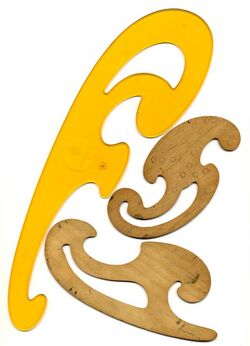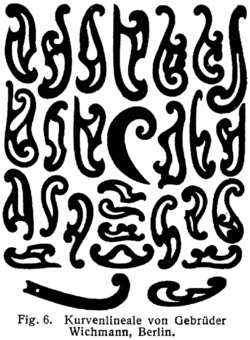French curve
From HandWiki
Short description: Template made from metal, wood or plastic composed of segments of smooth curves

A French curve is a template usually made from metal, wood or plastic composed of many different segments of the Euler spiral (aka the clothoid curve). It is used in manual drafting and in fashion design to draw smooth curves of varying radii. The curve is placed on the drawing material, and a pencil, knife or other implement is traced around its curves to produce the desired result. They were invented by the German mathematician Ludwig Burmester and are also known as Burmester (curve) set.
Clothing design

French curves are used in fashion design and sewing alongside hip curves, straight edges and right-angle rulers. Commercial clothing patterns can be personalized for fit by using French curves to draw neckline, sleeve, bust and waist variations.
See also
- Engineering:Flat spline – Long flexible batten used to produce a fair curve through a set of points
- Engineering:Lesbian rule – Flexible strip of lead for use in molding
- Ruler – An instrument used to measure distances or to draw straight lines
- Engineering:Technical drawing tool – Tools and instruments used for accurate and precise manual drafting
References
External links
- Weisstein, Eric W. French Curve from MathWorld.
- Use of the French Curve from Integrated Publishing.
 |
